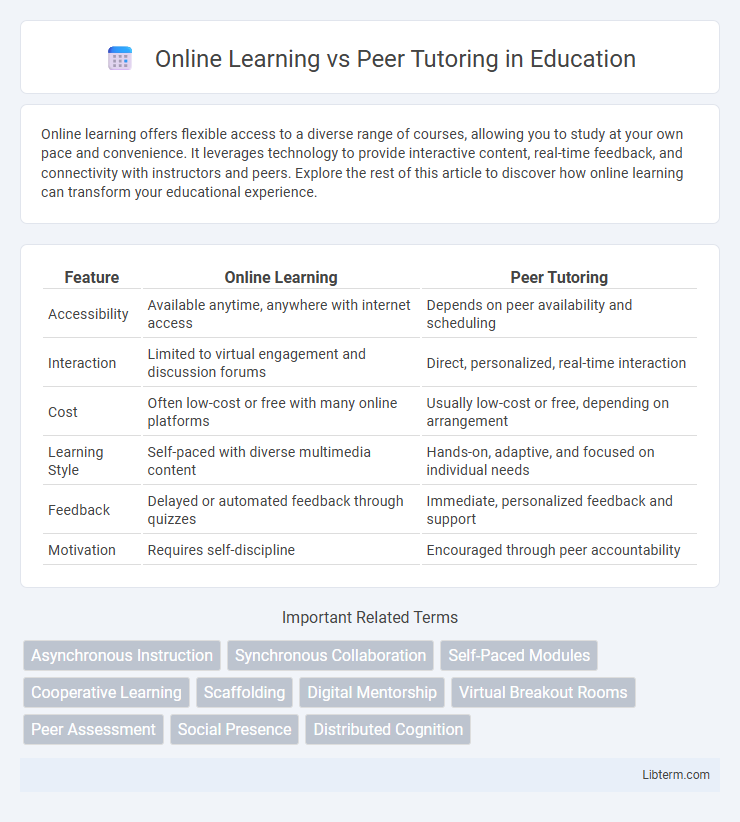Online learning offers flexible access to a diverse range of courses, allowing you to study at your own pace and convenience. It leverages technology to provide interactive content, real-time feedback, and connectivity with instructors and peers. Explore the rest of this article to discover how online learning can transform your educational experience.
Table of Comparison
| Feature | Online Learning | Peer Tutoring |
|---|---|---|
| Accessibility | Available anytime, anywhere with internet access | Depends on peer availability and scheduling |
| Interaction | Limited to virtual engagement and discussion forums | Direct, personalized, real-time interaction |
| Cost | Often low-cost or free with many online platforms | Usually low-cost or free, depending on arrangement |
| Learning Style | Self-paced with diverse multimedia content | Hands-on, adaptive, and focused on individual needs |
| Feedback | Delayed or automated feedback through quizzes | Immediate, personalized feedback and support |
| Motivation | Requires self-discipline | Encouraged through peer accountability |
Introduction to Online Learning and Peer Tutoring
Online learning offers flexible access to educational content through digital platforms, enabling students to engage with interactive resources and multimedia lessons anytime and anywhere. Peer tutoring involves collaborative learning where students support each other's understanding by explaining concepts, solving problems together, and providing personalized feedback. Integrating online learning with peer tutoring can enhance knowledge retention, improve academic performance, and foster a supportive learning community.
Key Differences Between Online Learning and Peer Tutoring
Online learning offers structured courses delivered through digital platforms, enabling self-paced study, diverse multimedia resources, and broad access to expert instructors. Peer tutoring emphasizes personalized, interactive support with peers facilitating understanding through dialogue and real-time feedback, fostering collaborative learning. Key differences include the mode of delivery, level of personalization, and the nature of interaction, with online learning being more formal and scalable, while peer tutoring provides tailored, social engagement.
Accessibility and Convenience
Online learning platforms provide unparalleled accessibility by offering a vast range of courses available anytime and anywhere, accommodating diverse schedules and learning paces. Peer tutoring enhances convenience through personalized support and immediate feedback, often tailored to specific student needs and learning styles. Combining the flexibility of online resources with the interactive nature of peer tutoring creates an inclusive and effective educational experience.
Personalization of Learning Experience
Online learning platforms use adaptive algorithms to tailor content based on individual performance, enabling personalized pacing and targeted feedback. Peer tutoring offers customized support through real-time interaction, allowing tutors to adjust explanations and strategies according to a learner's unique needs and learning style. Combining both methods can enhance personalization by leveraging technology's data-driven insights alongside human empathy and adaptability.
Social Interaction and Collaboration
Online learning platforms offer structured environments for social interaction through discussion boards, video calls, and group projects, fostering collaboration among diverse participants worldwide. Peer tutoring encourages direct, personalized communication, enhancing social bonds and immediate feedback that improve collaborative learning experiences. Combining online learning with peer tutoring maximizes interactive opportunities, promoting deeper understanding and teamwork skills.
Cost and Resource Considerations
Online learning offers cost-effective access to a wide range of courses with minimal material expenses, benefiting institutions and students by reducing infrastructure and transportation costs. Peer tutoring, while potentially less scalable, requires fewer technological resources and can provide personalized support with lower financial investment in software and platforms. Balancing the affordability of digital content and the localized, low-cost nature of peer interactions helps education providers optimize budgets and resource allocation.
Effectiveness in Academic Performance
Online learning platforms offer personalized pacing and diverse multimedia resources, enhancing student engagement and retention, which contributes positively to academic performance. Peer tutoring provides immediate feedback, social interaction, and tailored explanations, fostering deeper understanding and critical thinking skills. Studies indicate combining online learning with peer tutoring yields higher academic achievement by leveraging technology's flexibility and interpersonal support.
Technology’s Role in Modern Education
Technology plays a pivotal role in modern education by enhancing both online learning platforms and peer tutoring systems, enabling interactive and personalized learning experiences. Online learning leverages AI-driven tools, video conferencing, and virtual simulations to facilitate flexible access to educational content anytime, anywhere. Peer tutoring benefits from technology by utilizing collaborative apps and instant communication channels that foster real-time feedback and knowledge sharing among students.
Student Engagement and Motivation
Online learning platforms offer interactive tools and multimedia resources that enhance student engagement by catering to diverse learning styles, while peer tutoring provides personalized support and immediate feedback that boosts motivation through social interaction and accountability. Studies indicate that students involved in peer tutoring often exhibit higher motivation levels and deeper comprehension due to collaborative learning dynamics. Combining online learning's flexibility with peer tutoring's interpersonal encouragement creates a synergistic effect that significantly improves student engagement and motivation.
Choosing the Right Method for Individual Needs
Choosing the right learning method depends on individual preferences, learning styles, and goals; online learning offers flexibility, access to diverse resources, and self-paced study, ideal for independent learners. Peer tutoring provides personalized support, immediate feedback, and social interaction, benefiting students who thrive in collaborative environments. Evaluating factors like motivation, subject complexity, and available support helps determine whether online learning or peer tutoring better suits specific educational needs.
Online Learning Infographic

 libterm.com
libterm.com